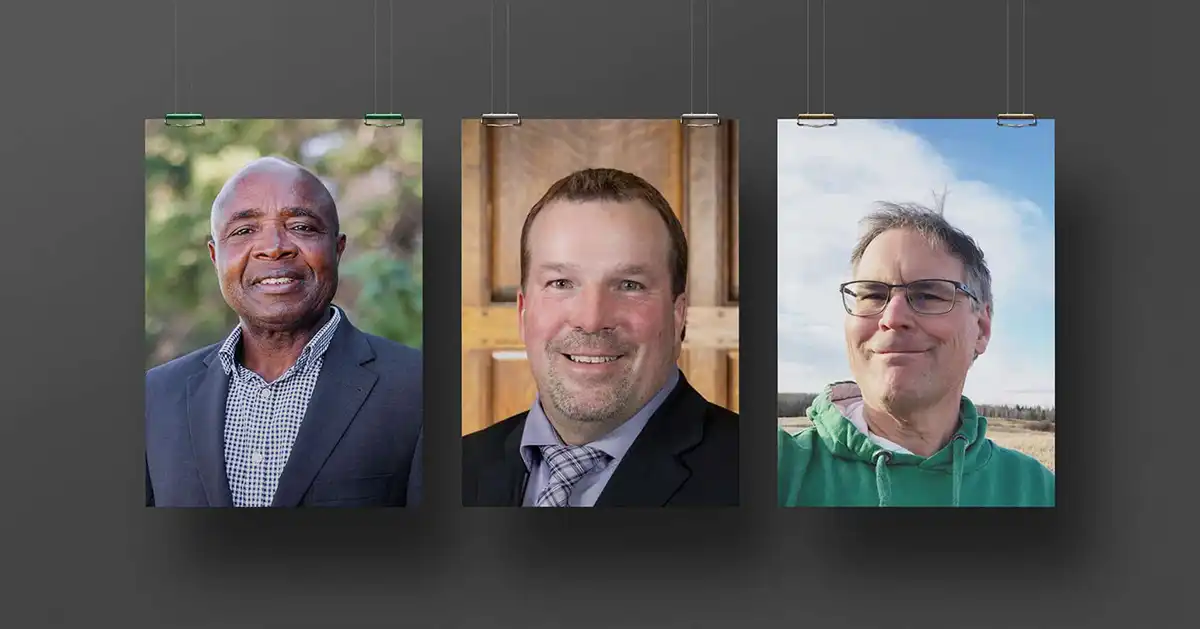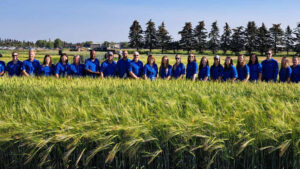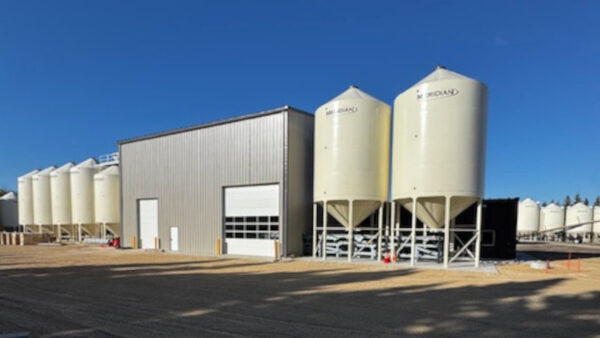Jason Lenz and the board of the new Western Crop Innovations (WCI) have a once in a lifetime opportunity ahead of them: to lay the foundation of the organization anew while managing the transition of assets from when it was known as the Field Crop Development Centre.
Despite the challenges ahead, he’s encouraged by current progress to date.
Since announcing last month that the FCDC has been rebranded as WCI (a non-profit formed to take on the transition and guide the facility into the future), WCI now has an interim executive director on board — Mark Olson, former interim general manager for Alberta Grains — and is currently looking ahead to planning its field day as part of AgSmart, a partnership that started last year with great success when the FCDC Field Day combined with AgSmart for the first time.
“From the outset, our priority has been ensuring transparency and stability for WCI’s existing staff. We’ve succeeded in providing them with a sense of security as they prepare for the upcoming research season,” Lenz says. “While there’s much to be done, we’re pleased with our initial steps forward.”
Lenz is also a board member for Results Driven Agriculture Research (RDAR). He’s served as director on numerous agriculture commissions and councils such as Alberta Grains, the Western Grains Research Foundation, and the Canada Grains Council. Lenz has served on various regional agriculture advisory councils such as ALUS Canada Lacombe County and AgSmart Olds. He’s also a grain farmer and operates a cow-calf beef operation in Bentley, Alta.
Two other RDAR board members join him as the interim board for WCI — Fred Lozeman (who’s been farming and ranching in Alberta for almost 30 years and has sat on numerous agricultural boards) and D’Arcy Hilgartner (who has served as chair of the Alberta Pulse Grower’s Association and the Alberta Grains Council).
As part of the WCI Transition Management Plan, WCI will go through a 12-month review and where necessary, will be transitioned to ensure crop innovations support Alberta’s farmers’ needs now and into the future, according to the province.
The transition plan document was prepared by John Conrad, assistant deputy minister at Alberta Agriculture and Irrigation, and seeks the near-term investment of industry partners over the next year.
“Our focus will be on engaging with stakeholders throughout Alberta and Western Canada. We aim to understand their research needs and identify any gaps where WCI can offer support. Barley breeding remains a key aspect of our program, and we intend to explore the balance between malt and feed barley varieties in response to stakeholder feedback,” Lenz says.
He says outreach will extend to grower groups and also include livestock associations and more, such as Alberta Beef and Alberta Milk.
“We’re committed to addressing their research priorities, whether related to forages, feed, or other areas of interest. In the short term, our barley breeding program will continue in its current state, while we develop long-term business and science plans over the coming year that we envision will be broader than simply breeding for new barley varieties.”
Creating a New Organization
Turning the Field Crop Development Centre into Western Crop Innovations has been no minor task. Conrad was involved from the beginning, having become acquainted with then-FCDC Program Director Kofi Agblor.
Late last year, Olds College issued notice that it was unable to secure longer term program funding for FCDC. A plan was needed to figure out the road ahead.
“FCDC celebrated 50 years in 2023. Thanks to the skills and efforts of FCDC staff over the years, innovation in barley and crop breeding has a strong history in Alberta; closing down the centre was something nobody wanted to see,” Conrad says.
This past January, representatives from government, producer commissions, and agricultural producer groups — specifically from the crops and livestock sector, academia, malting, and seed industries — met to discuss the future of FCDC. All stakeholders agreed that the FCDC must continue, but the focus and priorities of the centre need to be revamped.

The Right Mindset
Conrad isn’t new to agriculture. He grew up on a farm. Despite spending his career in the military — he spent over three decades in the army and has authored a number of books and articles on Canada’s involvement in Afghanistan) — agriculture was never far from his thoughts.
“When it became clear in 2023 that a path forward was needed to ensure the future of this facility, I was happy to help with the project,” he says.
For the province, the priority was assembling the right team to form the interim board, he says.
“The people currently serving, including our interim chair, Jason Lenz, were handpicked for their expertise and diverse perspectives from various sectors within agriculture. They’re bright minds who will guide us through this process of change,” Conrad says.
According to Conrad’s transition plan, over the next year, WCI will develop a long-term plan for the next phase of work out of the centre. The plan will include:
- Input from valued industry, public and academic stakeholders;
- A long-term vision for WCI;
- Performance measures to ensure WCI’s new strategic direction and objectives are in line with industry needs, and that those needs are being met;
- A proposed financial support model and governance structure to provide long term stability to enable achievement of WCI’s stated goals and objectives.
But success isn’t just about having the right people in place; it’s also about adopting the right mindset, Conrad notes.
“Listening attentively and seeking feedback are important. This includes engaging with the talented staff who have been integral to the success of the Field Crop Development Centre.”
Agblor echoes that sentiment. After serving as managing director of the Crop Development Centre at the University of Saskatchewan from 2012-2019, he moved to the FCDC in 2022 after it came under the umbrella of Olds College.
“As WCI moves forward, everyone who comes to the table will have to have a good understanding of how to craft a holistic vision that emphasises the facility’s strong points and can position it for the future,” Agblor says.
“Thankfully, WCI has a terrific staff that understands how to do this and who will help everyone at that table navigate the road ahead.”
Getting it Right
According to Alberta Agriculture Minister R.J. Sigurdson, the province needs a sustainable structure for crop development — and WCI is part of that.
“By establishing Western Crop Innovations, we’re laying the groundwork for success. This centre will ensure that research efforts align with the needs and interests of our producers. It’s about harnessing the unique qualities of Alberta’s growing conditions and leveraging them to strengthen research initiatives across the province,” he says.
“In considering our approach, we’re going to draw insights from various jurisdictions. Some rely solely on post-secondary institutions for research, while others place the responsibility entirely on government. However, our aim is different. We envision a collaborative effort that blends the strengths of both sectors as well as industry expertise and support.”
That’s the reasoning behind allocated funding for a one-year period, he says — to facilitate these conversations and ensure things are done right. Funding of $3.5 million is being provided to the new organization comprised of $1.2 million from Alberta Agriculture and Irrigation, $2 million from RDAR, and the balance from industry partners.
“The intention is to gather input from farmers, ranchers, agencies, boards, commissions, scientists, and post-secondary institutions. This collaborative effort will shape the governance structure of the WCI, reflecting the collective vision we’ve cultivated through dialogue and consultation.”
That vision will be needed. Since the FCDC’s transition to Olds College in 2021, the FCDC implemented a strategic plan. One of its initial steps was engaging with stakeholders to identify key focus areas. Recently, FCDC completed a science plan that outlines the methodology to achieve the goals set out in the strategic plan.
FCDC Business Development Officer Erin Collier told Seed World Canada at last summer’s AgSmart event that since plant breeding is a long-term endeavour, and the varieties the FCDC is working on today won ‘t be available for licensing for almost a decade, long-term planning is vital for the survival of the facility.
“It’s crucial to incorporate industry and producer feedback to ensure our trajectory aligns with future needs. Our science plan is aimed at 2030, a mere seven years away. We’re determined to establish FCDC as a center of excellence for barley and triticale breeding. We’re striving to have FCDC varieties grown on most barley acres in Western Canada,” she said at the time.
“That goal might seem lofty, but with the changes we’re implementing — from modernizing operations to focusing on efficiency — it’s within reach.”











